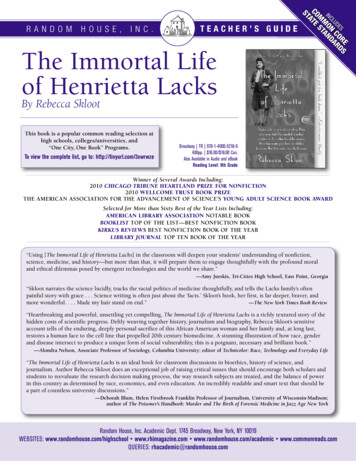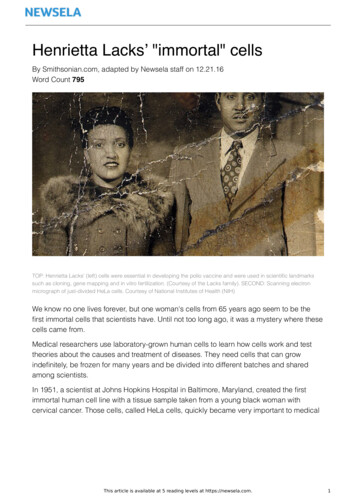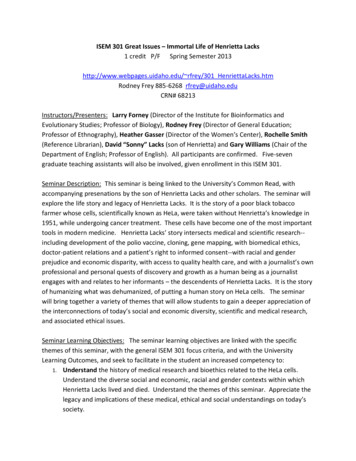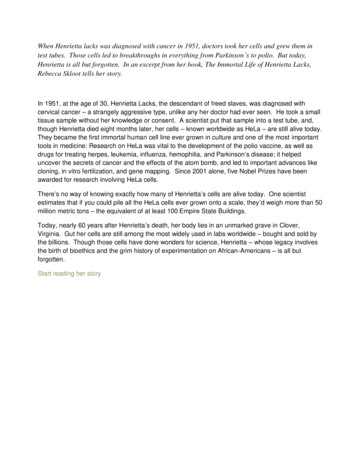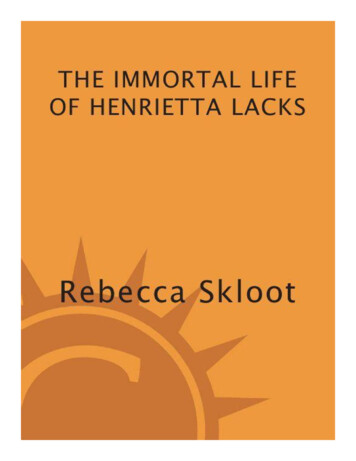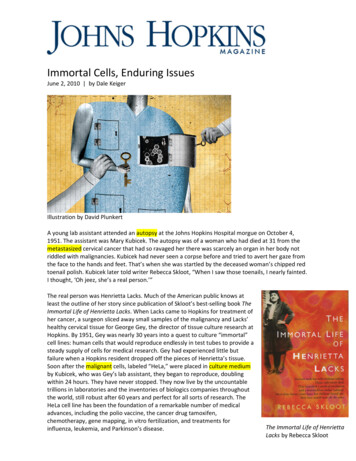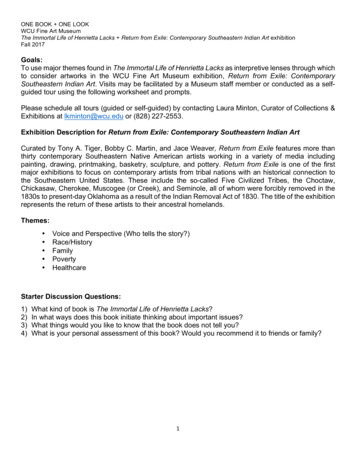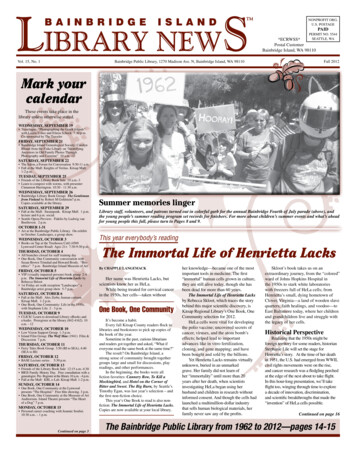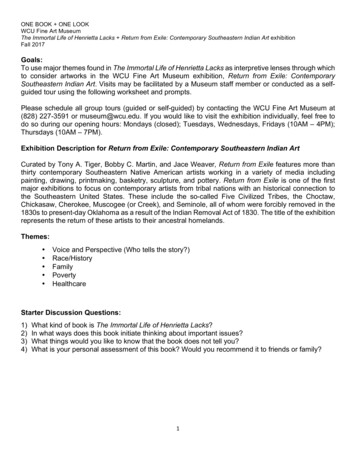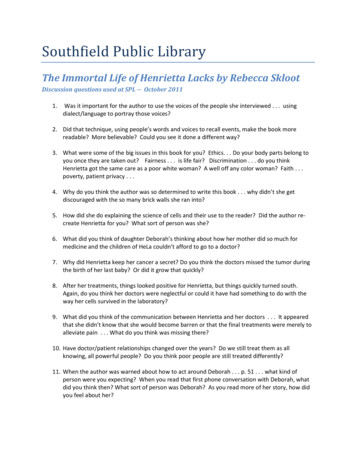
Transcription
Southfield Public LibraryThe Immortal Life of Henrietta Lacks by Rebecca SklootDiscussion questions used at SPL -- October 20111.Was it important for the author to use the voices of the people she interviewed . . . usingdialect/language to portray those voices?2. Did that technique, using people’s words and voices to recall events, make the book morereadable? More believable? Could you see it done a different way?3. What were some of the big issues in this book for you? Ethics. . . Do your body parts belong toyou once they are taken out? Fairness . . . is life fair? Discrimination . . . do you thinkHenrietta got the same care as a poor white woman? A well off any color woman? Faith . . .poverty, patient privacy . . .4. Why do you think the author was so determined to write this book . . . why didn’t she getdiscouraged with the so many brick walls she ran into?5. How did she do explaining the science of cells and their use to the reader? Did the author recreate Henrietta for you? What sort of person was she?6. What did you think of daughter Deborah’s thinking about how her mother did so much formedicine and the children of HeLa couldn’t afford to go to a doctor?7. Why did Henrietta keep her cancer a secret? Do you think the doctors missed the tumor duringthe birth of her last baby? Or did it grow that quickly?8. After her treatments, things looked positive for Henrietta, but things quickly turned south.Again, do you think her doctors were neglectful or could it have had something to do with theway her cells survived in the laboratory?9. What did you think of the communication between Henrietta and her doctors . . . It appearedthat she didn’t know that she would become barren or that the final treatments were merely toalleviate pain . . . What do you think was missing there?10. Have doctor/patient relationships changed over the years? Do we still treat them as allknowing, all powerful people? Do you think poor people are still treated differently?11. When the author was warned about how to act around Deborah . . . p. 51 . . . what kind ofperson were you expecting? When you read that first phone conversation with Deborah, whatdid you think then? What sort of person was Deborah? As you read more of her story, how didyou feel about her?
12. What’s your opinion on researcher Gey visiting Henrietta . . . Do you think he did? On p. 103 itshows that Gey was unhappy about the way other scientists were using HeLa cells . . . did itseem as though he thought they belonged to him? Did they?13. Did the good that Henrietta’s cells did for the world, from health to economic to scientificbreakthroughs, make up for the way she was treated?14. Why were the scientists upset when the cells were traced back to Henrietta?15. There was much in the early part of the book about how the family never knew aboutHenrietta’s cells . . . If you were in their shoes, would it be important to you? What would youwant to know . . . would you want financial compensation? Would you feel a sense of violationwhen you did find out?16. Which part was more interesting to you . . . The story of Henrietta or of her cells?17. How much science did you learn? Was it important to the story that information about cells andtheir biology was incorporated into the book?18. How would you characterize the Lacks family? Why do you think they felt the way they didabout their mother and her cells?19. How much did you know about people being used as research subjects, with or without theirconsent . . . Do you think it still goes on today? Do you read all the papers you sign at thedoctors?20. On p. 130, there is discussion on testing on humans by a doctor injecting people with cancercells. Some were prisoners, some ob/gyn patients . . . what did you think of his attitude?21. In your opinion, what was the most appalling treatment of the Lacks family by medicalpersonnel over the years?22. What were the differences between the other cell donors that the author talked about? Shouldpeople be able to profit from their own cells? Should doctors or corporations?23. Do you think Henrietta would have given consent to let her cells be used?24. How do you think Henrietta’s family reacted to the Skloot’s book? Would they have beenpleased with her portrayal?25. Why was it important to Deborah for her mother to be as famous as her cells were? Do youthink she finally is?26. Do you agree with the Lacks’ family desire to be compensated for Henrietta’s cells? Or forparticipating in the book? Did the author have any responsibility to do so? Does any author?27. Do you think this book makes a case for universal health care?
28. What do you think the author had in mind to accomplish with this book? Did she? Did she helpmake the life of the Lacks family any better?
Southfield Public LibraryGeneral discussion questions For the person who chose the book – What made you want to read it? What made you pick itfor the book club? Did it live up to your expectations? How is the book structured? First person? Third person? Flashbacks? Narrative devices? Do youthink the author did a good job with it? How would you describe the author’s writing style? Concise? Flowery? How is language used inthis book? Read aloud a passage that really struck you. How does that passage relate to thebook as a whole? How effective is the author’s use of plot twists? Were you able to predict certain things beforethey happened? Did the author keep you guessing until the end? Did the book hold your interest? How important is the setting to the story? Did you feel like you were somewhere else? Did thetime setting make a difference in the story? Did the author provide enough backgroundinformation for you to understand the setting and time placement? Which is stronger in the book – the characters or the plots? Would you recommend this book to someone else? Why? And to whom?
Southfield Public LibraryThe Immortal Life of Henrietta LacksQuestions taken from the author’s websitehttp://rebeccaskloot.com/1. On page xiii, Rebecca Skloot states, “This is a work of nonfiction. No names have been changed,no characters invented, no events fabricated.” Consider the process Skloot went through toverify dialogue, re-create scenes, and establish facts. Imagine trying to re-create scenes such aswhen Henrietta discovered her tumor (page 15). What does Skloot say on pages xiii–xiv and inthe notes section (page 346) about how she did this?2. One of Henrietta’s relatives said to Skloot, “If you pretty up how people spoke and change thethings they said, that’s dishonest” (page xiii). Throughout, Skloot is true to the dialect in whichpeople spoke to her: The Lackses speak in a heavy Southern accent, and Lengauer and Hsu speakas nonnative English speakers. What impact did the decision to maintain speech authenticityhave on the story?3. As much as this book is about Henrietta Lacks, it is also about Deborah learning of the mothershe barely knew, while also finding out the truth about her sister, Elsie. Imagine discoveringsimilar information about one of your family members. How would you react? What questionswould you ask?4. In a review for the New York Times, Dwight Garner writes, “Ms. Skloot is a memorable characterherself. She never intrudes on the narrative, but she takes us along with her on her reporting.”How would the story have been different if she had not been a part of it? What do you thinkwould have happened to scenes like the faith healing on page 289? Are there other scenes youcan think of where her presence made a difference? Why do you think she decided to includeherself in the story?5. Deborah shares her mother’s medical records with Skloot but is adamant that she not copyeverything. On page 284 Deborah says, “Everybody in the world got her cells, only thing we gotof our mother is just them records and her Bible.” Discuss the deeper meaning behind thisstatement. Think not only of her words, but also of the physical reaction she was having todelving into her mother’s and sister’s medical histories. If you were in Deborah’s situation, howwould you react to someone wanting to look into your mother’s medical records?6. This is a story with many layers. Though it’s not told chronologically, it is divided into threesections. Discuss the significance of the titles given to each part: Life, Death, and Immortality.How would the story have been different if it were told chronologically?7. As a journalist, Skloot is careful to present the encounter between the Lacks family and theworld of medicine without taking sides. Since readers bring their own experiences and opinionsto the text, some may feel she took the scientists’ side, while others may feel she took the
family’s side. What are your feelings about this? Does your opinion fall on one side or the other,or somewhere in the middle, and why?8. Henrietta signed a consent form that said, “I hereby give consent to the staff of The JohnsHopkins Hospital to perform any operative procedures and under any anaesthetic either local orgeneral that they may deem necessary in the proper surgical care and treatment of: ”(page 31). Based on this statement, do you believe TeLinde and Gey had the right to obtain asample from her cervix to use in their research? What information would they have had to giveher for Henrietta to have given informed consent? Do you think Henrietta would have givenexplicit consent to have a tissue sample used in medical research if she had been given all theinformation? Do you always thoroughly read consent forms before signing them?9.In 1976, when Mike Rogers’s Rolling Stone article was printed, many viewed it as a story aboutrace (see page 197 for reference). How do you think public interpretation might have beendifferent if the piece had been published at the time of Henrietta’s death in 1951? How is thisdifferent from the way her story is being interpreted today? How do you think Henrietta’sexperiences with the medical system would have been different had she been a white woman?What about Elsie’s fate?10. Consider Deborah’s comment on page 276: “Like I’m always telling my brothers, if you gonna gointo history, you can’t do it with a hate attitude. You got to remember, times was different.” Is itpossible to approach history from an objective point of view? If so, how and why is thisimportant, especially in the context of Henrietta’s story?11. Deborah says, “But I always have thought it was strange, if our mother cells done so much formedicine, how come her family can’t afford to see no doctors? Don’t make no sense” (page 9).Should the family be financially compensated for the HeLa cells? If so, who do you believe thatmoney should come from? Do you feel the Lackses deserve health insurance even though theycan’t afford it? How would you respond if you were in their situation?12. Dr. McKusick directed Susan Hsu to contact Henrietta’s children for blood samples to furtherHeLa research; neither McKusick nor Hsu tried to get informed consent for this research. Discusswhether or not you feel this request was ethical. Further, think about John Moore and thepatent that had been filed without his consent on his cells called “Mo” (page 201). How do youfeel about the Supreme Court of California ruling that states when tissues are removed fromyour body, with or without your consent, any claim you might have had to owning themvanishes?13. Religious faith and scientific understanding, while often at odds with each other, play importantroles in the lives of the Lacks family. How does religious faith help frame the Lackses’ responseto and interpretation of the scientific information they receive about HeLa? How does Skloot’sattitude toward religious faith and science evolve as a result of her relationship with theLackses?14. On page 261, Deborah and Zakariyya visit Lengauer’s lab and see the cells for the first time.How is their interaction with Lengauer different from the previous interactions the family had
with representatives of Johns Hopkins? Why do you think it is so different? What does the wayDeborah and Zakariyya interact with their mother’s cells tell you about their feelings for her?15. Reflect upon Henrietta’s life: What challenges did she and her family face? What do you thinktheir greatest strengths were?16. Consider the progression of Henrietta’s cancer in the last eight months between her diagnosisand death. How did she face death? What do you think that says about the type of person shewas?
The Immortal Life of Henrietta Lacks by Rebecca Skloot Discussion questions used at SPL -- October 2011 1. Was it important for the author to use the voices of the people she interviewed . . . using dialect/language to portray those voices? 2. Did that technique, using people's words and voices to recall events, make the book more readable?
